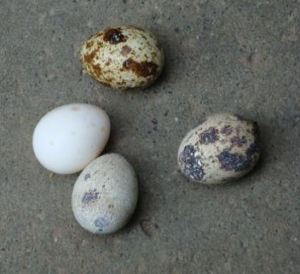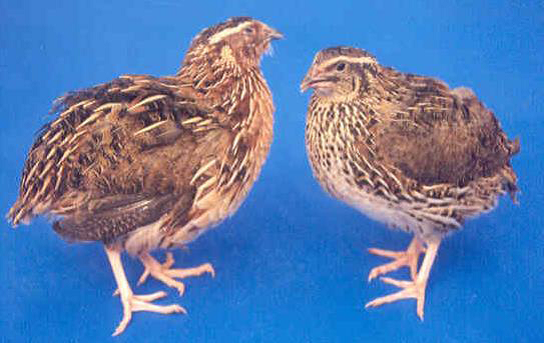IMPORTANCE OF QUAIL EGG
Siddharth Savale*, Gurunath pasare, Dhanraj Girimal, Udaykumar, Vidyasagar.
Corresponding Author: Siddharth Savale
Email ID: drsid1048@gmail.com
Veterinary officer, Government of Karnataka
Introduction:
Many folks, particularly in Asian countries, consume quail eggs. According to research, quail eggs are rich with vitamins and minerals, and despite their small size, their nutritional content is three to four times that of chicken eggs. Regular eating of quail eggs aids in the prevention of many diseases and acts as a natural antidote to digestive tract disorders such as stomach ulcers. Quail eggs help to boost the immune system, improve memory health, stimulate brain activity, and calm the nervous system. They help with anaemia by raising haemoglobin levels in the body while also eliminating toxins and heavy metals. Quail eggs have a better nutritional value than other eggs since they are rich in antioxidants, minerals, and vitamins and provide more nourishment than other foods (Lalwani, 2011).
Egg parts
Quail eggs are generally from white to brown in colour and mottled (black and brown spots). The average quail egg weight is about 11g, which is about more than 5 times smaller than the eggs of other bird species.The albumen makes up around 60 per cent of the mass of a quail egg. Chicken and turkey eggs contain a lower percentage of albumen (56%), and duck even lower (53%) and the yolk accounts for over one-third of the weight in quail eggs, and also in chicken, turkey, and duck eggs. Compared to other poultry eggs, the quail egg has the lowest percentage of shell weight in its overall mass (7.4%).
| Species | Egg
weight (g) |
% of egg mass | ||
| albumen | yolk | shell | ||
| Quail | 11.3 | 59.7 | 32.7 | 7.4 |
| Chicken | 58 | 55.8 | 31.9 | 12.3 |
| Turkey | 85 | 55.9 | 32.3 | 11.8 |
| Duck | 80 | 52.9 | 35.6 | 12.5 |
- TOLIK et al.2014
Chemical and nutrient composition of quail egg
The quail albumen consists of almost 88% water, 10% protein and 1% ash, and its chemical composition is similar to chicken egg. The yolk is lower in fat and higher in ash than the yolk of a chicken egg. The chemical composition of quail eggs in comparison to chicken egg is presented in below.

Quail Eggs
| Parameter | Species | |
| Quail | Chicken | |
| Albumen (%) | ||
| Water | 87.8 | 87.9 |
| Protein | 10.4 | 10.6 |
| Ash | 1.0 | 0.6 |
| Yolk (%) | ||
| Water | 49.7 | 48.7 |
| Protein | 16.0 | 16.6 |
| Fat | 31.5 | 32.6 |
| Ash | 1.8 | 1.0 |
The most prominent nutrition facts of quail eggs include vitamins and minerals in quail eggs
| Quail eggs nutrition facts per 100 g | |
| Vitamin B1 | 0.130 mg |
| Vitamin B2 | 0.790 mg |
| Vitamin B6 | 0.150 mg |
| Vitamin D | 55 IU |
| Vitamin A | 156 mcg/100 g |
| Iron | 3.65 mg |
| Phosphorus | 226 mg |
| Sodium | 141 mg |
| Macronutrients in quail eggs (calories, carbs, fat, protein, cholesterol) per 100 g | |
| Calories | 158 kcal |
| Protein | 13.05 g |
| Fat | 11.09 g |
| Cholesterol | 844 mg |
| Carbohydrates | 0.41 g |
| Sugars | 0.4 g |
*Small amounts of calcium, magnesium, potassium, zinc, vitamins B3 and B9
Quails eggs health benefits
- Less allergenic compared to chicken and other eggs.
- Beneficial for anaemia due to high iron content and vitamins B9 and B12, which assist in the formation of red blood cells and haemoglobin in red blood cells, which transports oxygen to tissues.Easy on the stomach, good food to eat for gastritis and other digestive disorders.
- Protein-rich, having advantages for healing injured muscle, developing new muscle, and reducing weight.Contain all essential amino acids for brain and nervous system health.
- The fatty acids and protein in eggs may provide benefits for dizziness, mood changes, memory, and learning enhancement.
- Because of its high vitamin B9 concentration, which helps infants’ brain development during pregnancy and it can help to prevent neural tube abnormalities of the brain, spine, and spinal cord in newborns during pregnancy.
- Good content of vitamin B12 and cholesterol for healthy nerve cells. Vitamin B12 and cholesterol in quail eggs lower risk of demyelination (loss of the protective myelin coating surrounding nerve cells), potentially contributing to reduced risks for multiple sclerosis and other degenerative diseases of the nervous system.
- Increase immunity with the help of a healthy vitamin D content and a lot of protein. Quail eggs’ vitamin D affects the immune system’s operation, and its protein promotes in the production of antibodies.
- Good for strong bones and teeth as a result of a good content of phosphorus and vitamin D and small amounts of calcium and magnesium.
- Potential benefits for allergic rhinitis and asthma, the high protein content of quail eggs helps you have thick hair.
- Quail eggs promote fertility in both men and women by providing vitamins and minerals such as vitamin D, selenium, manganese, and zinc, as well as supporting successful pregnancy outcomes.
- Advantages for high blood sugar levels – Quail eggs are a low GI food with blood sugar control benefits, and they reduce the influence of other foods on blood sugar.
- Vitamin A, copper, manganese, iron, and fatty acids all have antioxidant characteristics that are good for the skin and eyes.
Quail egg production
The eggs are heavily mottled and weigh around 10 g. (dark colours of different shades and shapes on the shell). Because the egg shell of the Japanese quail has a mosaic pattern and is thin, care must be given while collecting and keeping these eggs. However, a line that produces white eggs has been established. The size of the egg gradually grows as the bird grows. There are various advantageous in raising Japanese quails.
Conclusion
The nutritional prominence of quail eggs is described in the article above is enough for a literate to know why quail eggs should be preferred. Quail eggs have lower fat content as compared to chicken eggs, however the cholesterol levels are similar. Quail eggs are easy to cook while compared to other eggs. Studies have depicted that Quail eggs improve metabolism, promote bone strength, help to speed up recovery, beneficial to the respiratory system, help in maintaining regular sugar levels in the blood, help relieve depression, detox our bodies, boost concentration, and have anti-aging properties.


